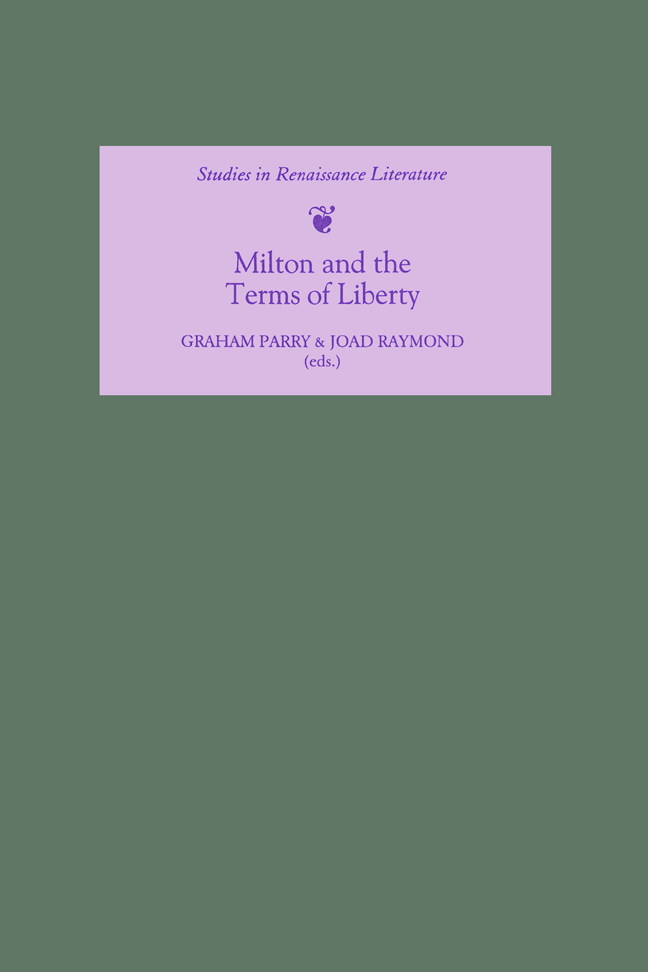Book contents
- Frontmatter
- Contents
- Contributors
- Acknowledgements
- Introduction
- 1 John Milton and the Politics of Slavery
- 2 Milton before ‘Lycidas'
- 3 Prosody and Liberty in Milton and Marvell
- 4 'In These Western Parts of the Empire': Milton and Roman Law
- 5 The King is a Thing
- 6 'in time of Warre … our Language is all corrupt with military Tearms': The Politics of Martial Metaphors in Post-regicide England
- 7 Alexander More Reads Milton: Self-representation and Anxiety in Milton's Defences
- 8 Stylometry and the Provenance of De doctrina christiana
- 9 The Figure and the Ground: Samson as a Hero of London Nonconformity, 1662-1667
- 10 The Publication of the King's Privacy: Paradise Regained and Of True Religion in Restoration England
- 11 'To try, and teach the erring Soul': Milton's Last Seven Years
- 12 Pandemonic Panoramas: Surveying Milton's ‘vain empires’ in the Long Eighteenth Century
- Index
- Studies in Renaissance Literature
2 - Milton before ‘Lycidas'
Published online by Cambridge University Press: 15 February 2024
- Frontmatter
- Contents
- Contributors
- Acknowledgements
- Introduction
- 1 John Milton and the Politics of Slavery
- 2 Milton before ‘Lycidas'
- 3 Prosody and Liberty in Milton and Marvell
- 4 'In These Western Parts of the Empire': Milton and Roman Law
- 5 The King is a Thing
- 6 'in time of Warre … our Language is all corrupt with military Tearms': The Politics of Martial Metaphors in Post-regicide England
- 7 Alexander More Reads Milton: Self-representation and Anxiety in Milton's Defences
- 8 Stylometry and the Provenance of De doctrina christiana
- 9 The Figure and the Ground: Samson as a Hero of London Nonconformity, 1662-1667
- 10 The Publication of the King's Privacy: Paradise Regained and Of True Religion in Restoration England
- 11 'To try, and teach the erring Soul': Milton's Last Seven Years
- 12 Pandemonic Panoramas: Surveying Milton's ‘vain empires’ in the Long Eighteenth Century
- Index
- Studies in Renaissance Literature
Summary
IN 1645, after four years in which he apparently wrote little poetry but in which he produced his five antiprelatical pamphlets, the divorce tracts, his tolerationist Areopagitica and his Hartlibian jottings, Of Education, Milton published his first collection of verse. This consists of almost all the extant poetry he had written since childhood, a curious volume that offers a family album of young Milton's poetic – and political – development. Twenty years ago, I attempted a political reading which argued that its publication, in 1645, constituted a claim to the respectability of its author that disputed attempts by Presbyterians and their allies to associate him with a crude stereotype of the Independent or sectary as tradesman preacher. In passing I remarked on the evidently unrevolutionary character of the poems he wrote before ‘Lycidas’ (1637). But other and more influentia lpolitical readings took a different view. In the masque Comus, David Norbrook, Leah Marcus and Michael Wilding identified counter-cultural elements deeply critical of the early Stuart ascendancy. More recently a substantial essay by Barbara Lewalski in a new collection by Stephen Dobranski and John Rumrich has confirmed the consensus, though Annabel Patterson's chapter in a Pebworth-Summers collection takes a different view and an article by David Loewenstein in Milton Studies approximates more closely to my own original position.
This paper represents a more irenic compromise than I should once have intended. First, and most simply, I take a more sympathetic view of the kinds of reading backwards that Wilding and others have done; that project seems wholly defensible, if somewhat self-fulfilling. If, like Martin Amis in Time's Arrow, you narrate events backwards, inevitably you come to the source and origin of all that follows. Milton in 1642, plainly, is a radical revolutionary on the militant wing of English antiprelatical sentiment; in 1649 he is regicidal and a republican; his writings in 1626 or 1634 inevitably are the early writings of such a militant; time's arrow unerringly flies backwards to its target. The subtext has with ingenuity been interrogated; but I shall argue that has been done at the expense of the text, not recognising its closer affinities to the dominant ideology.
- Type
- Chapter
- Information
- Milton and the Terms of Liberty , pp. 23 - 36Publisher: Boydell & BrewerPrint publication year: 2002

